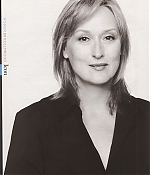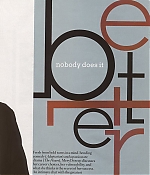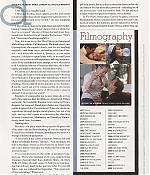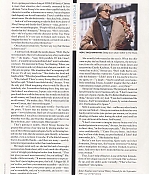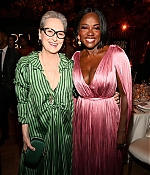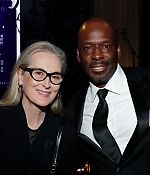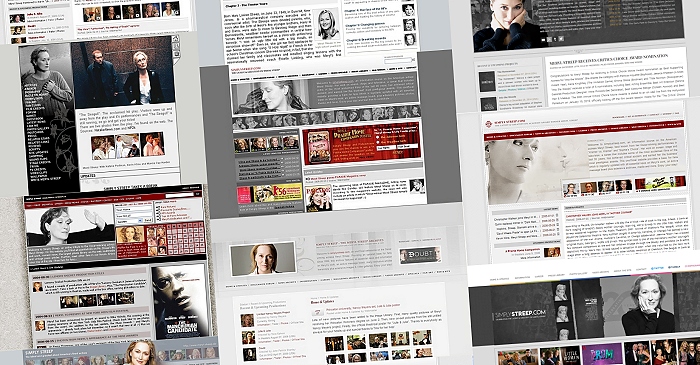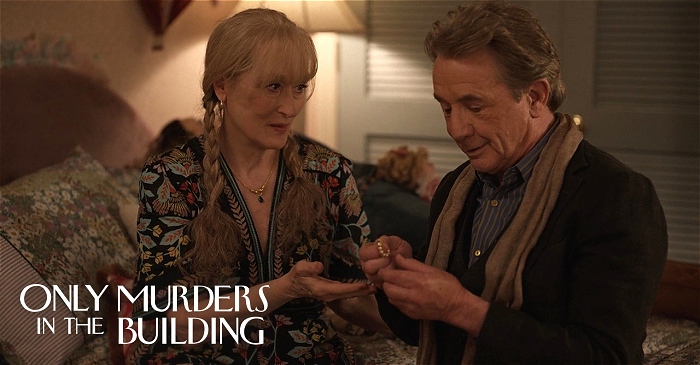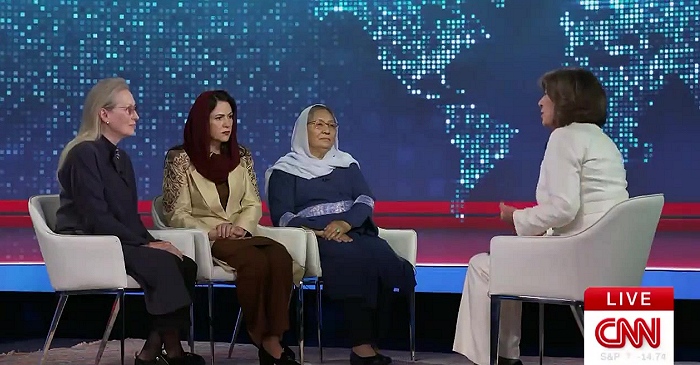
|
Nobody Does It Better
Premiere ·
November 2002
· Written by James Kaplan
|

A few facts about Meryl Streep you should know at the outset:
1. She has a nice, naughty laugh.
2. She has a flawless, nearly ageless, peaches-and-cream complexion, which has clearly logged mininal beach time. “I have never liked sand in my crotch,” she says (laughing naughtily).
3. Her drink of choice is the pink-hued and subtly lethal-looking Cosmopolitan. (“I don’t know what’s in them, but they’re very good,” she says.) Streep learned about Cosmopolitan from her friend Natasha Richardson. “She’s bad,” Streep says (laughing naughtily).
Now, this is not to say that Meryl Streep got hammered while talking with me. Full disclosure. She drank exactly one Cosmopolitan, she sipped it slowly , and she was laughing naughtily – and doing voices, and making subtle fun of herself – well before she ordered it. Streep is, as you might imagine, a delight to spend time with, in no small part because she is short on self-importance and long on theatricality. If the combination seems strange, so be it. She carries it off. Unlike the vast run of American film stars, she is thoroughly grounded in the theatre. And she likes to play.
It’s almost as if, because she has been taken so seriously for so long, she needs to work (or play) extra hard to focus us on her humanity. The weight of her legendhood, of those 12 [13 -mk] Oscar nominations (she’s won twice), must sometimes feel crushing. If you could sit in the audience at the Academy Awards, you’d see every young actress in the house watching Streep’s every move. Is Meryl going to stand to applaud? Is she going to stay seated?
Similarly, it’s impossible not to stare when she arrives (only 3 minutes late) for drinks at a Greenwich Village restaurant. So irresistibly dramatic is her entrance (floppy disguise-hat removed, blond mane shaken out, inimitable profile displayed), that I’m snookered: When she sits down, she regards me through purple-tinted glasses, lets out a big sigh, and says she’s spent an exhausting day shuttling between Connecticut, Manhattan and Brooklyn. I immediately think: limo: Locations.
Nothing like it.
In reality, the place where Streep spends the great bulk of her time, she had been shuttling all over the map in her Toyota Prius on family business.
“I don’t look at my career as separate from my life and all the vicissitudes therein,” she says. “And you know, my tent is bustling – there’s a lot of activity in there! I run out to do a movie every once in a while, but I’m in the tent most of the day.”
It’s a role that comes naturally to an eldest child and the only girl in the family. But try to draw a connection between that role and some of the characters she’s portrayed, including one of the most recent, and she bridles a little. No fair asking a wonder-worker to explain her wonders, even to herself.
In {The} Hours, Streep plays Clarissa Vaughan, a modern Manhattanite whose existence seems utterly devoted to the needs of others: her domestic partner (played by Allison Janney), her teenage daughter (Claire Danes), and her long-ago lover, a genius poet who is dying of AIDS (Ed Harris). Clarissa is more than attentive, she’s virtually consumed by her altruism. Yet in Streep’s far-more-than-capable hands, the character is neither a doormat nor a martyr, but an eloquent (and elegant) case for self-surrender: There’s a nobility to her attentiveness. She also looks terrific – hair, skin, body, clothes.
And so it’s all to tempting to take the little bit we know of Meryl Streep and decide that Clarissa is – okay, go for it – out-and-out autobiography. “People will look at Clarissa and decide that she’s bourgeois,” Streep says, “She’s very motherly – she’s a piece of the character in One True Thing that I played. It’s very easy to disdain such women. To imagine that they’re – uninteresting on a certain level, and to have them feel that way about themselves.”
One advances tentatively. “Is there any way that Clarissa is close to you?”
A sideways look through the purple glasses. “Well. Maybe not consciously. I have yet to deconstruct any of my work to find the -” she laughs – “nasty little parallels. If I did, I don’t know – it would [express] something I don’t want to articulate, you know. I’m interested in flying, not thinking. Not thinking. Where you find your sources and everything is not what gets you aloft – or what gets me going. I like imagining that I’m imagining it all! I’m sure it’s all very much me.” She shakes her head and laughs a little. “Who [else] are all these characters I’ve played?”
Who, indeed? There’s a story Streep likes to tell about herself as a girl. “I think I was a little bit odd,” she says. “I was the only girl; I liked imagining what it would be like to be somebody else. I remember thinking that a long time ago. And when I was about ten, I spent a day with an eyebrow pencil and drew in all the lines in my face to make me look like an old woman, and I made my mother take pictures of me as an old woman.” She makes a face. “Well it looks exactly like me now! I mean, that’s the terrifying part.”
Not at all – at 53, she looks quite terrific – but this isn’t the point. “I know that my mother was -“ she laughs again – “worried about me. But I sort of was interested in my grandmother; I was always interested in older people, and what they were like, and what they thought, and what it was like to be them, and — other people. Other people.”
That’s putting it mildly. Meryl Streep became the greatest film actress of our time not by playing another version of Meryl Streep again and again, but by so throwing herself into her roles that she seemed, quite literally, to become another, even as we knew it was she. It’s the kind of sorcery that in less skillful hands – and there are many – quickly turns into impersonation rather than transformation.
Her magic noted early on, she had the kind of overnight success actors dream about; still, it only made the obligatory years of struggle psychological rather than financial. “That just gives you much more insecurity! Are you kidding?” She laughs a little nervously. “It marries insecurity to expectation. So it’s just a higher precipice, that’s all. A bigger fall. If you’re alive, and have your emotions accessible – and it’s in your interests to have your pores open as an artist – then you’re woundable, you’re vulnerable, and you’re – you know – terrified all the time.”
She actually looks scared as she says it. When the offer came to play the lead female role in Adaptation, the new picture from the offbeat team of director Spike Jonze and screenwriter Charlie Kaufman, “I was just thrilled that they wanted me to do it,” Streep says, “But I really had to convince myself that they wanted me. ‘Cause I stand so far outside this business – I didn’t know if it was maybe a favor to my agent, or – “a laugh – “maybe somebody owed somebody something. I mean, I couldn’t imagine that they didn’t want someone younger, prettier, sexier – everything.”
Streep isn’t being disingenuous. She purposefully distanced herself from the movie business early on. “I don’t mean it as some sort of point of pride, like I’m Robert Redford or something,” she says with a wry look. “I just don’t understand the business. And I’m intimidated, I guess, by certain elements of it. The business of it, I guess.”
Still, it seems safe to say that – unlike any other female star one can think of – Streep can continue to dictate her own familycentric terms (one picture per annum; no location shooting, or theatre roles, during the school year) until her 11-year-old is out of the house. And beyond.
“I don’t even want to imagine that my brains won’t be mashed potatoes in seven years,” she says, but she would love to direct then, “in the theatre especially.” She lowers her voice confidentially. “’Cause I’m very bossy. And when they’re all out of the house, my poor husband, if I don’t find some outlet, he’s. . .” She shakes her head.
But let’s not leave out acting. Quite early on in her formation, Streep says, she became interested “in being able to manipulate my image, and how I looked, to serve a story. And not to have how I looked define me, as an actress or as a woman.”
That, I can’t help telling her, is one of the best formulations of her unique success I’ve ever heard. Her eyebrows fly up, and she smiles quite wickedly. “That’s the Cosmopolitan!” she explains.



Posted on November 17th, 2024
|
Posted on November 7th, 2024
|
Posted on November 1st, 2024
|
Posted on October 10th, 2024
|
Posted on September 26th, 2024
|


